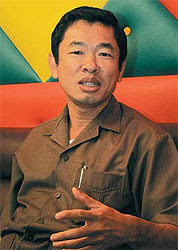 In this photo from the Cambodian Documentation Center shows Kaing Khek Iev, left, also know as Duch, and his aid Sok in Phnom Penh in 1976. Duch, who ordered the torture and killing of at least 14,000 men, women and children, in the late 1970's has been take to the Cambodian genocide tribunal headquarters Tuesday, July 31, 2007, to be questioned by judges. On July 18, 2007, prosecutors submitted to the investigating judges the cases of five former Khmer Rouge leaders recommended to stand trial. The names of the five suspects have not been revealed. (AP Photo/Documentation Center, File)
In this photo from the Cambodian Documentation Center shows Kaing Khek Iev, left, also know as Duch, and his aid Sok in Phnom Penh in 1976. Duch, who ordered the torture and killing of at least 14,000 men, women and children, in the late 1970's has been take to the Cambodian genocide tribunal headquarters Tuesday, July 31, 2007, to be questioned by judges. On July 18, 2007, prosecutors submitted to the investigating judges the cases of five former Khmer Rouge leaders recommended to stand trial. The names of the five suspects have not been revealed. (AP Photo/Documentation Center, File)
The Associated PressPHNOM PENH, Cambodia -- The former chief of a Khmer Rouge prison is willing to testify about the communist regime's atrocities that led to an estimated 1.7 million deaths in the 1970s, Cambodia's genocide tribunal announced Wednesday.
Duch, 64, also known as Kaing Guek Eav, on Tuesday became the first top Khmer Rouge figure to be indicted for offenses committed when the Khmer Rouge held power from 1975-79. He was charged and detained by order of the U.N.-backed international tribunal's foreign and Cambodian judges.
Duch headed the S-21 prison in Phnom Penh, where some 16,000 suspected enemies of the regime were tortured before being taken out and executed on what later became known as the "killing fields" near the city. Only about a dozen prisoners are thought to have survived. The site is now the Tuol Sleng Genocide Museum.
The judges' detention order, posted on the tribunal's Web site Wednesday, said Duch had acknowledged that he headed S-21 and was "ready to reveal the crimes committed by the Khmer Rouge."
It also cited prosecutors' allegations that he presided over abuses against civilians including "arbitrary detention, torture and other inhumane acts, (and) mass executions."
"He is implicated by many documents and several witnesses," the detention order said.
The tribunal also announced that one of the two lawyers expected to defend Duch is Francois Roux, a human rights activist from France best known for being on the defense team of Zacarias Moussaoui, a Moroccan-born Frenchman convicted in the U.S. of conspiring to commit terrorism and kill Americans in connection with the Sept. 11, 2001 terror attacks.
Roux also defended four cases of genocide at the International Criminal Tribunal for Rwanda.
Duch, who said he could not afford to pay for legal representation, selected Roux and a Cambodian lawyer, Kar Savuth, from a list compiled by the tribunal. Kar Savuth has represented Duch for the past eight years while he was detained at a Phnom Penh military prison on separate war crimes charges.
The tribunal, officially known as Extraordinary Chambers in the Courts of Cambodia, is expected to start conducting trials early next year.
Cambodia's holocaust saw as many as one-fifth of the country's citizens die as a result of the radical policies of the Khmer Rouge and their leader, Pol Pot.
Pol Pot died in 1998, but three of his senior-level colleagues are living freely in Cambodia, though in declining health: Nuon Chea, the movement's chief ideologue; Ieng Sary, the former foreign minister; and Khieu Samphan, the former head of state.
Prosecutors have recommended that five Khmer Rouge leaders be indicted, and all three are widely believed to be on their list, although no names besides Duch's have been released.
According to a transcript of a 1999 government interview obtained by The Associated Press, Duch said "Nuon Chea (also) had direct command over S-21."
"I was under other people's command, and I would have died if I disobeyed it. I did it without any pleasure, and any fault should be blamed on the (Khmer Rouge leadership), not me," he told the government interviewer soon after his arrest in May 1999. Prior to that he had spent decades under an assumed name.
Nuon Chea, the right-hand man to Pol Pot, has consistently denied any responsibility for the mass brutality.
"I was president of the National Assembly and had nothing to do with the operation of the government," he told the AP in an interview last month. "Sometimes I didn't know what they were doing because I was in the assembly."
"I will go to the court and don't care if people believe me or not," he said.
The judges' detention order for Duch cited prosecutors' allegations that "under his authority, countless abuses were allegedly committed against the civilian population."
The abuses included "arbitrary detention, torture and other inhumane acts, mass executions, which occurred within a political context of widespread or systematic abuses and constitute crimes against humanity," it said.
It said one of Duch's lawyers had challenged the detention on the basis "that the other suspects remain at liberty," and requested his client be released on bail.
The judges denied the request, saying granting him freedom could provoke public anger.
Duch's current provisional detention will last up to one year and can be extended for another year if the investigating judges uncover new crimes in which he was implicated, said tribunal spokesman Reach Sambath.
According to tribunal rules, the maximum penalty for conviction of crimes is life imprisonment.




























